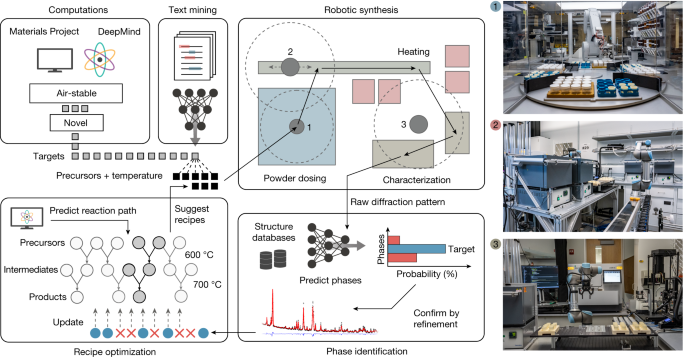AI-Powered Autonomous Labs Achieve 10x Acceleration in Materials Discovery

Introduction
A new wave of AI-powered autonomous laboratories have accelerated materials discovery at an unprecedented rate, achieving breakthroughs 10 times faster than traditional research approaches. This significant development, announced in August 2025, is reshaping scientific innovation across industries from semiconductors to energy storage[1].
How AI Drives Rapid Materials Discovery
The breakthrough centers on integrating advanced machine learning algorithms with cutting-edge robotic hardware. These labs operate independently to conduct experiments, analyze data, and iterate on research hypotheses, minimizing human intervention and reducing the risk of error[1]. Key capabilities include:
- Real-time data processing and experiment execution
- Dynamic optimization of material properties
- Automated identification of novel compounds for electronics and batteries
Industry experts highlight the competitive edge this gives companies, allowing them to shrink product development timelines from years to months while maintaining rigorous standards of reproducibility and scalability[1].
Tangible Impacts Across Industries
AI-driven discovery has already yielded promising results, such as the identification of new battery materials that boost efficiency—a potential game-changer for electric vehicles and renewable energy technologies[1]. Posts on X (formerly Twitter) by Dr. Singularity and others demonstrate growing excitement around these rapid advances. The synergy of AI with fields like nanotechnology and biotech is enabling the detection of patterns and phenomena previously invisible to human researchers.
Additionally, automating repetitive and error-prone lab tasks frees up scientists to focus on high-level creativity and innovation. This is fostering a new era of efficiency and productivity in R&D environments[1].
Challenges and Future Perspectives
While the acceleration is dramatic, challenges remain. Data security and intellectual property protections are paramount given the enormous value of proprietary discoveries. As these autonomous labs evolve, there is rising interest in robust governance frameworks and ethical guidelines to guide responsible AI deployment. The consensus among experts: autonomous experimentation will drive the next frontier in scientific research, sparking innovations that could power economies for decades.
Conclusion: Transforming the Scientific Landscape
The advent of AI-powered autonomous labs marks a pivotal moment for research and industry. By automating key processes and leveraging machine learning for dynamic discovery, organizations can respond faster to global challenges—from sustainable materials to next-gen electronics. As adoption spreads, expect greater collaboration between AI engineers, domain scientists, and data security experts, fueling an era of accelerated innovation and new commercial opportunities[1].
How Communities View AI-Powered Autonomous Labs
The announcement of autonomous AI labs revolutionizing materials discovery has ignited discussion across X/Twitter and Reddit’s r/MachineLearning and r/Futurology subreddits.
Key opinion clusters:
-
Optimists (estimated 45%): Enthusiastic posts from users like @DrSingularity hail this as 'the greatest leap in lab productivity since CRISPR,' predicting a cascade of new discoveries and commercialization breakthroughs.
-
Skeptics (about 25%): Some, like r/Futurology’s u/NoHumanRequired, question the reliability of fully automated science and raise concerns about replicability, ethical oversight, and the potential for errors.
-
Industry observers (20%): Tech insiders and researchers (e.g., @mattyAI and r/MachineLearning mods) are intrigued by implications for intellectual property, data protection, and the changing landscape for human researchers.
-
Privacy and ethics advocates (around 10%): These voices focus on the need for transparent governance, data privacy, and oversight to safeguard both scientific integrity and sensitive information.
Notable contributions include expert commentary from @AI_ScienceLead and r/AskScience flair-users, who stress that responsible deployment and regulation will determine whether these labs truly benefit society.
Overall sentiment is cautiously positive: most users see transformative potential but want ethical and security risks addressed before widespread adoption.